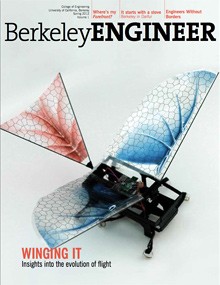Green governor
Sometimes hot is not cool. Computers have gotten faster and faster, but the transistor hasn’t kept pace with the push for greater efficiency. Its power supply voltage, which governs a chip’s power draw and heat generation, has been stuck at one volt thanks to the laws of physics. But Sayeef Salahuddin, assistant professor of electrical engineering and computer sciences, and his graduate student Asif Khan demonstrated that transistors can indeed be green. The researchers showed that a capacitor made with a ferroelectric material paired with a dielectric could produce a negative capacitance. Transistors, they say, will now be able to generate a larger charge from a smaller voltage—a low-power solution that promises to reduce how much energy computers gobble up and the heat they release without compromising performance.

